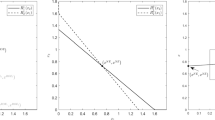Abstract
In this paper, we propose a distribution-free model instead of considering a particular distribution for multiple objective games with incomplete information. We assume that each player does not know the exact value of the uncertain payoff parameters, but only knows that they belong to an uncertainty set. In our model, the players use a robust optimization approach for each of their objective to contend with payoff uncertainty. To formulate such a game, named “robust multiple objective games” here, we introduce three kinds of robust equilibrium under different preference structures. Then, by using a scalarization method and an existing result on the solutions for the generalized quasi-vector equilibrium problems, we obtain the existence of these robust equilibria. Finally, we give an example to illustrate our model and the existence theorems. Our results are new and fill the gap in the game theory literature.
Similar content being viewed by others
References
Nash, J.F.: Equilibrium points in n-person games. Proc. Natl. Acad. Sci. USA 36(1), 48–49 (1950)
Nash, J.F.: Noncooperative games. Ann. Math. 54, 286–295 (1951)
Harsanyi, J.: Games with incomplete information played by ‘Bayesian’ players, Part I, II, III. Manag. Sci. 14 (3, 5, 7) (1967 and 1968)
Luo, G.M., An, X., Xia, J.Y.: Robust optimization with applications to game theory. Appl. Anal. 88, 1183–1195 (2009)
Hayashi, S., Yamashita, N., Fukushima, M.: A combined smoothing and regularization method for monotone second-order cone complementarity problems. SIAM J. Optim. 175, 335–353 (2005)
Nishimura, R., Hayashi, S., Fukushima, M.: Robust Nash equilibria in N-person noncooperative games: uniqueness and reformulation. Pac. J. Optim. 5, 237–259 (2009)
Aghassi, M., Bertsimas, D.: Robust game theory. Math. Program., Ser. B 107, 231–273 (2006)
Ben-Tal, A., Nemirovski, A.: Robust convex optimization. Math. Oper. Res. 23, 769–805 (1998)
Ben-Tal, A., Nemirovski, A.: Robust solutions of uncertain linear programs. Oper. Res. Lett. 25, 1–13 (1999)
Ben-Tal, A., Nemirovski, A.: Selected topics in robust convex optimization. Math. Program. 112, 125–158 (2008)
Blackwell, D.: An analog of the minimax theorem for vector payoffs. Pac. J. Math. 6, 1–8 (1956)
Shapley, L.S.: Equilibrium points in games with vector payoffs. Nav. Res. Logist. Q. 6, 57–61 (1959)
Ghose, D., Prasad, U.R.: Solution concepts in two-person multicriteria games. J. Optim. Theory Appl. 63, 167–189 (1989)
Yuan, X.Z., Tarafdar, E.: Non-compact Pareto equilibria for multiobjective games. J. Math. Anal. Appl. 204, 156–163 (1996)
Ding, X.P.: Pareto equilibria of muliticriteria games without compactness, continuity, and concavity. Appl. Math. Methods 17, 847–854 (1996)
Ding, X.P.: Existence of Pareto equilibria for constrained multiobjective games in H-space. Comput. Math. Appl. 39, 125–134 (2000)
Borm, P., van Megen, F., Tijs, S.: A perfectness concept for multicriteria games. Math. Methods Oper. Res. 49, 401–412 (1999)
Aggarwal, S., Bhatia, D.: Vector-valued constrained games and multiobjective symmetric duality. Asia-Pac. J. Oper. Res. 8, 106–118 (1991)
Zhao, J.: The equilibrium of a multiple objective game. Int. J. Game Theory 20, 171–182 (1991)
Zeleny, M.: Games with multiple payoffs. Int. J. Game Theory 4, 179–191 (1975)
Wang, S.Y.: Existence of a Pareto equilibrium. J. Optim. Theory Appl. 79, 373–384 (1993)
Yang, H., Yu, J.: Essential components of the set of weakly Pareto-Nash equilibrium points. Appl. Math. Lett. 15, 553–560 (2002)
Chen, G.Y., Yang, X.Q., Yu, H.: A nonlinear scalarization function and generalized quasi-vector equilibrium problems. J. Glob. Optim. 32, 451–466 (2005)
Borm, P.E.M., Tijs, S.H., van den Aarssen, J.C.M.: Pareto equilibrium in multiobjective games. Methods Oper. Res. 60, 303–312 (1990)
Acknowledgements
This research was supported by the National Natural Science Foundation of China (Grant number: 70871126; 90924009; 71101160) and Program for New Century Excellent Talents in University of Ministry of Education of China (Grant number: NCET-10-0843).
Author information
Authors and Affiliations
Corresponding author
Rights and permissions
About this article
Cite this article
Yu, H., Liu, H.M. Robust Multiple Objective Game Theory. J Optim Theory Appl 159, 272–280 (2013). https://doi.org/10.1007/s10957-012-0234-z
Received:
Accepted:
Published:
Issue Date:
DOI: https://doi.org/10.1007/s10957-012-0234-z




